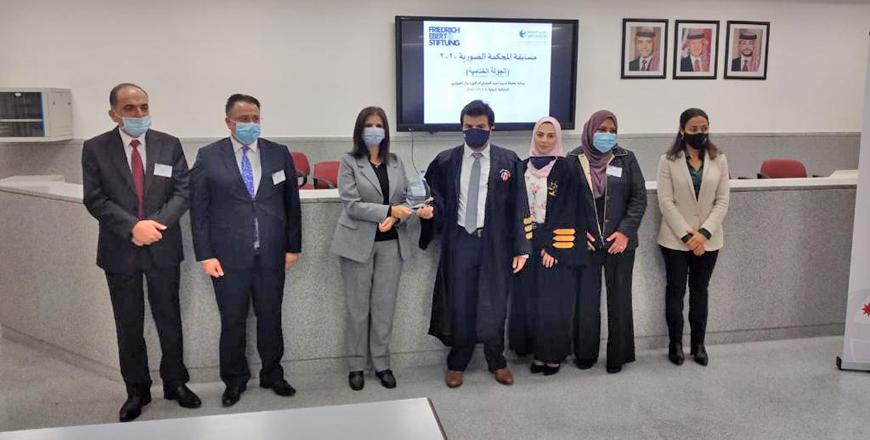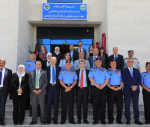You are here
Report sheds light on government’s anti-corruption commitments
By Bahaa Al Deen Al Nawas - Dec 10,2020 - Last updated at Dec 10,2020
AMMAN — Rasheed for Integrity and Transparency (Transparency International - Jordan) on Wednesday published the updated results of monitoring the Jordanian government’s implementation of its 11 commitments at the Anti-Corruption Summit: London 2016.
The publishing was in cooperation with Transparency International- UK and the Jordanian Integrity & Anti-corruption Commission (JIACC), with funding from UK aid.
Rasheed prepared key performance indicators (KPIs) to measure the implementation of each of the assigned commitments based on scientific standards approved by Transparency International-UK.
The JIACC distributed the KPIs on the concerned entities.
According to the instructions of former prime minister Omar Razzaz in April of 2019, a national committee was formed to follow-up on the commitments, headed by the JIACC.
The committee’s members include: The Prime Ministry/government achievement unit, the ministries of Planning and International Cooperation, Foreign Affairs and Expatriate Affairs, Youth, Digital Economy and Entrepreneurship, Finance (Income and Sales Tax Department), Public Works and Housing (Government Tender Department), the Ministry of Justice and the Ministry of Industry, Trade and Supply.
They also include the General Supplies Department, the Central Bank of Jordan, the Anti-Money Laundering and Counter Terrorist Financing Unit, the Companies Control Department, the Jordan Investment Commission and the Public Security Directorate, in addition to Rasheed.
The commission also followed-up closely with each of the entities, collecting the documents related to the achievements, backed by official evidence.
The latest semi-annual monitoring process has revealed “significant progress” compared with the previous ones that were issued on May, 2020, according to a statement shared with The Jordan Times.
The currently completed commitments amount up to 27 per cent, compared with 9.1 per cent in the past report. The percentage of the commitments currently under implementation from the remaining ones decreased to 73 per cent compared with 90.9 per cent that were in progress last May, while no inactive commitments were recorded since the previous report, according to the statement.
Executive Director of “Rasheed” Abeer Mdanat told The Jordan Times that in the latest monitoring report, two new commitments have been completed: The first focuses on developing innovative ways to check and combat corruption, boosting cooperation in determining and supporting new innovations in the field, while also exchanging good practices and encouraging their use.
“The JIACC established an innovation hub at its headquarters while a team is currently reviewing the future vision of the innovation and training project,” Mdanat said.
The second commitment focuses on Jordan’s joining of the International Partnership against Corruption in Sport (IPACS) after having submitted an official application through the Olympic Committee to ensure the Kingdom’s joining application is approved, Mdanat added.
In the earlier report, the first completed commitment focused on combating tax evasion in the private sector through the amendments to the Income Tax Law number 34 for 2014 under the amended law number 38 for 2018, according to the statement.
A set of measures based on various penal and tax legislations were taken for the purpose of implementing this commitment.
The total number of completed commitments amounted to three out of 11, while eight are in progress.
The commitments of the Kingdom still in progress include: Exploring public central registers of company beneficial ownership information, working with other countries, civil society and international organisations to support accelerated implementation of the voluntary provisions of the UN Convention against Corruption, and welcoming the establishment of transparent central registers of foreign companies bidding on public contracts and buying property, and intending to explore options for taking similar action.
They include joint work with other countries to share information between respective public-private partnerships, with the aim to ensure the most effective response to international money laundering and exploring ways of sharing information on corrupt bidders across borders. The methods comprise lists of companies and individuals involved in corruption and the parties convicted. These lists form a national and international reference to ensure that such people do not engage in procurement and bidding.
The commitments in progress also include strengthening the asset recovery legislation through non-conviction based confiscation powers and the introduction of unexplained wealth orders; supporting the establishment of an OECD anti-corruption centre to strengthen the impact and coherence of the OECD existing anti-corruption efforts; and developing common principles governing the payment of compensation to the countries affected, to ensure that such payments are made safely, fairly and in a transparent manner.
The results, recommendations and evidence of implementation are published nationally on Rasheed’s website, “The Eight’s Tracker” (http://the8stracker.org/).
They are also available globally through Transparency International-United Kingdom (https://www.anticorruptionpledgetracker.com/country/jordan/), which is the international monitor for the implementation of the summit’s commitments, as it currently monitors the implementation results of the commitments of 20 countries, according to the statement.
This cooperation between the JIACC and the non-profit organisation “Rasheed” is an embodiment of the cooperation agreement signed by the two parties and consolidates cooperation between civil society organisations and the government, the statement concluded.
Related Articles
AMMAN — The Jordanian Integrity and Transparency Coalition “Rasheed” on Wednesday issued a statement expressing its dissatisfaction over the
AMMAN — Rasheed for Integrity and Transparency (Transparency International-Jordan) on Sunday held a moot court competition for law students
AMMAN — Transparency International’s Jordanian chapter, Rasheed for Intregrity and Transparency, recently launched the “Jordanian compass fo














